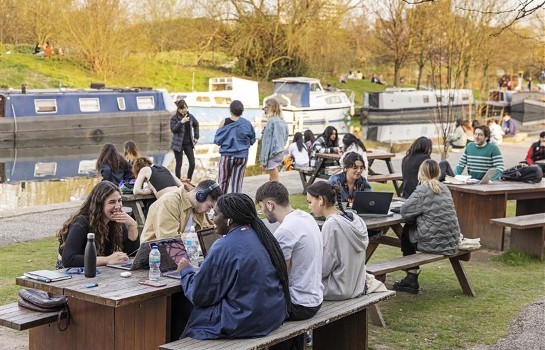Supporting student co-creation in the medical undergraduate curriculum review

In collaboration with
This project aims to support authentic and sustainable student co-creation in our current review and re-design of the medical undergraduate MB BS curriculum [MBBS curriculum 2030]. The resources and training materials can also be shared for wider use in student co-creation projects across Queen Mary University of London.
Responding to a need
As the Faculty of Medicine and Dentistry undergoes a review and re-design of the MB BS undergraduate curriculum, a key priority is to work together in radical new ways with learners in co-creation of the new curriculum. Our QMUL 2030 strategy commits to ensuring that students are co-creators in their education and learning environment and we are dedicated to delivering a progressive and inclusive curriculum that is designed with the student at the centre.
So far, in the very early stages of the curriculum review, there has been little opportunity for authentic student co-creation. The next stages of the review offered a chance to engage students in a meaningful and authentic way, and to support both faculty and students in effective co-creation as the curriculum review progresses.
This project [underpinned by a Queen Mary Academy Fellowship for GE] aims to support these co-creation activities. This has involved close collaboration with QM Academy experts, guided by its co-creation roadmap, and the co-development (with RT, VS and RP), of new bespoke recruitment, training and support resources which could also be used across the wider university on other student or stakeholder co-creation projects.
The approach
Developing an evidence-based approach
At the heart of the project has been an extensive review of the literature on co-creation in higher education, and medical education in particular. In the early stages of the project, GE undertook a scoping review of key literature on co-creation in medical curricula and this guided the approach and design of the workshops for staff and students.
In parallel, a much more extensive review was carried out by medical student Rob Tucker as a special study project dissertation in his 4th year course (supervised by GE) entitled 'What are the Educational Benefits and Challenges to Co-Creation in Medical Education?' This has been invaluable in exploring underlying educational theories, impact evidence and experiences of co-creation from several other medical schools, and has fed into further development of the project, including workshop design, recruitment and ongoing support approaches for students.
Key References
- Könings, K. D., Mordang, S., Smeenk, F., Stassen, L., & Ramani, S. (2021). Learner involvement in the co-creation of teaching and learning: AMEE Guide No. 138. Medical teacher, 43(8), 924-936.
- Bovill, C., & Bulley, C. J. (2011). A model of active student participation in curriculum design: exploring desirability and possibility.
- Bovill C, Cook-Sather A, Felten P, Millard L, Moore-Cherry N. 2016. Addressing potential challenges in co-creating learning and teaching: overcoming resistance, navigating institutional norms and ensuring inclusivity in student–staff partnerships. High Educ. 71(2):195–208.
Design and delivery of co-creation workshop for MBBS staff
Based on this evidence-base, GE first designed and delivered a 2.5-hour workshop for faculty – with a small number of medical students attending. Developed with feedback from colleagues Elise Gasser (QM Academy Innovation and Learning Manager) Ana Cabral and Lousie Younie (Queen Mary Academy Flourishing Fellow).
The purpose of this workshop was to:
- Introduce staff to the key principles and approaches to curriculum co-creation with both students and patients
- Outline options and relevant examples of co-creation in literature and other institutions
- Use the QM Co-creation roadmap as a structure to clarify planning and implementation of working with students
- Help staff and students together, to consider the benefits and anticipate challenges of their co-creation projects
The learning objectives for the workshop were:
By the end of this workshop, you should be able to…
- Define what we mean by working with students/co-creation
- Discuss benefits, challenges and impact of co-creation
- Explain the different levels of possible student involvement
- Describe different approaches to working with students
- Develop a basic plan for your next steps for working with students in curriculum review
- Use a co-creation roadmap when planning curriculum review
Recruitment of 6 medical students as co-creation Curriculum Development Advisors
Soon after this workshop with staff and students, work started on recruitment of students as dedicated Curriculum Development Advisers to take an active role in co-creation. This was led by VS, and GE and RT advised on the ingredients of the job profile and advert, informed by their understanding of the relevant literature. The posts required formal approval by IHSE Board.
Key features of the job advert/profile included:
- Payment
- Detailed role tasks and description
- Additional benefits for students [for example]:
- Induction session, including overview of the curriculum review process and discussion of your roles and responsibilities
- Training workshop focusing on key (transferable) skills such as giving and receiving challenging feedback, confidence to speak up, and managing power hierarchies.
- Ongoing support from peers and faculty mentor
- Opportunity to apply for:
- Associate Fellow of Higher Education Academy [entitlement to use post-nominal letters - AFHEA, increasingly sought by employers across the education sector]
- Student membership of Academy of Medical Educators
- SEED Award [Student Enhanced Engagement and Development Award]. If successful, you will receive a certificate and the award will feature on your HEAR transcript.
Bespoke training sessions for students (and staff) involved in curriculum co-creation
Working with QM Academy, VS and RT, GE (QM Academy Fellow) developed a bespoke co-creation training session for students, designed as a substantial element of induction for students recruited to the role of Curriculum Development Advisors.
The literature on co-creation in medical education suggests that training sessions for students and patients is crucial in the success of co-creation projects in several areas including [Konings et al, 2021]:
- Giving and receiving constructive feedback [safe communication]
- Facilitating discussions about respect and fairness, and distributing power
- Moving away from complaints culture to problem-solving
- Clarifying roles and responsibilities
The workshop lasts 4 hours, with breaks, and has elements of instruction, discussion and skills training using simulation. Staff will also attend to take part in discussions and role plays. NB It has not been possible to deliver this workshop yet, as students have not been recruited to the posts.
Learning objectives for the workshop:
By the end of the workshop students should be able to:
- Describe the co-creation project and their roles and responsibilities in it
- Discuss the benefits and challenges of co-creation for students
- Use effective strategies for constructive feedback conversations with faculty
- Use effective models for communicating assertively and dealing with conflict
“Really positive move by the IHSE to include students in creating content for teaching that involves students to the upmost extent”
Impact
Short-term benefits
In the short-term, the faculty workshop on co-creation raised awareness of the project, engaging approximately 25 staff and students. Outputs from the workshop included identification and recording of challenges of co-creation for both staff and students, and suggested practical approaches/solutions for co-creation. Feedback from participants suggests that it was a constructive event which moved the co-creation project forwards:
- Similar problems faced by both students and staff but the desire to drive this forward and work together was noticeable
- Student input - it was so useful
- Really positive move by the IHSE to include students in creating content for teaching that involves students to the upmost extent
- Interesting to think about the degrees of co-creation and pros and cons
- I'd like to make sure more staff come - 20 is fine but ideally ALL academic staff should be firmly expected to attend.
RT and GE presented a poster describing the design of the co-creation project at the QM Festival of Education, thus widening awareness of the project and sharing our approaches with colleagues across the institution. RT and GE plan to submit a paper on the project to Student BMJ.
Medium-term benefits
We now have detailed lesson plans for faculty co-creation workshop [also delivered], student co-creation workshop/induction [to be delivered shortly]; and experience and resources to support recruitment of students to long-term co-creation projects.
In addition, we have an extensive literature review/evidence-base for co-creation approaches in higher education which we can share with colleagues across the university, and very shortly a group of selected students to focus co-creation activities in the medical curriculum review and re-design.
Long-term benefits
We plan a formal evaluation to gauge the influence of the project on students and staff in their co-creation activities.
Recommendations
The main message from our project is the importance of having a programme to support students and staff in their co-creation activities. There are crucial attitudes and skills, as well as structures, that the literature suggests can make the difference between success and failure.
In particular we would recommend:
- An evidence-based approach, and to work with colleagues who have already worked on co-creation projects.
- Staff and student training and ongoing support in co-creation activities
- Space for listening and discussion between staff and students
- A clear process for recruitment of students to co-creation projects [resources, including our JD, available to share]
- Training to address:
- Giving and receiving constructive feedback [safe communication]
- Facilitating discussions about respect and fairness, and distributing power
- Moving away from complaints culture to problem-solving
- Clarifying roles and responsibilities, so expectations are clear from outset
